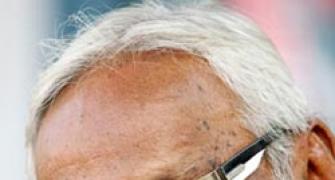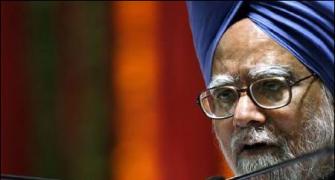Importing gold widens current account deficit, channels domestic savings into personal investments and of course forces domestic entrepreneurs to scout for foreign funds, writes M R Venkatesh.
The Indian economy is in a crisis. But that is not "the crisis." The real crisis is that in the assessment of the Indian Government, our economy is NOT in crisis. Worse still, probably the government has no assessment in the first place. In the alternative, what if the assessment itself is a dishonest one?
 In such a scenario, the government obviously is in moral crisis making the economic crisis relatively a smaller one. In short, if the economy is not in a crisis, the government is in a moral crisis. Welcome to India under UPA (United Progressive Alliance)!
In such a scenario, the government obviously is in moral crisis making the economic crisis relatively a smaller one. In short, if the economy is not in a crisis, the government is in a moral crisis. Welcome to India under UPA (United Progressive Alliance)!
Let us for a moment forget the moral dimension. The truth remains that our economy is in a crisis. In fact, it is a pincer moment for the economy reeling under elevated inflation for over four years, an unsustainable current account deficit and a gargantuan fiscal deficit.
And to be fair to the managers of the economy, their options are dwindling by the day; it is akin to a man having a mere loin cloth and plans to stitch a three-piece suit.
Well for all those doubting Thomas the recent statement of the finance minister was a giveaway. "I am confident that the steps we have taken, and some more steps that we will take in the next few weeks, will help turn the Indian economy around," he is reported to have said.
And pray what are the steps taken by the government? Allowing foreign direct investment (FDI) in retail and civil aviation is supposed to "boost economic growth and restore investor confidence." Further steps on the anvil include increased FDI in insurance and pension. It would seem for the UPA, managing economy is all about hiking FDI limits in various sectors.
In addition, the Union Cabinet has cleared setting up of Cabinet Committee of Investment to fast-track large projects entailing investment of over Rs 1,000 crore (Rs 10 billion). Well, who is the proposed chairman of the same? The Prime Minister! Given his track record in being proactive, one can expect reams of blank papers camouflaging as minutes of this committee.
Nevertheless serious questions remain unanswered. Will growth restore confidence or restoring confidence in the economy boost growth? Well, what is the sequence? Crucially, let us first look at the challenges faced by the Indian economy.
Gold as an attractive investment proposition
Current account and fiscal deficits are the twin ills plaguing the Indian economy. They enjoy a symbiotic relationship between them. In effect, all these are in a way manifestation of the difference between a country's investment and savings; production and consumption.
This was brilliantly articulated by Andy Mukherjee (How India can avoid a grave economic crisis - Business Standard 26th September 2012) when he states, "The twin problems started in February 2008, when New Delhi undermined a six-year process of deficit reduction by announcing a $15-billion (Rs 60,000 crore) farm debt waiver."
This fuelled inflation - the natural outcome of twin deficits. In retrospective analysis the timing was worse. It coincided with the global economic downturn which forced a sharp depreciation of the Indian rupee from Rs 39 to a dollar to well above Rs 52 within a matter of weeks.
The Government of India could not use a strong rupee, on account of the global financial crisis then, as an antidote to inflation.
That was not all. That blunder, Andy Mukherjee writes, was "compounded by several other acts of fiscal irresponsibility, had a pernicious effect on the nation's savings-investment dynamics." Once this was disturbed, the economy saw tectonic shifts. To me that is the crux of the issue.
Fiscal profligacy, let us not forget, undermines a currency. This is equally true for the US dollar or the Indian rupee. Simply put, while dollar depreciated against gold on account of American profligacy, the Indian rupee depreciated against the dollar on account of our government's recklessness.
Readers may note that when US President (Barack) Obama was elected to office the international price of gold was $850 per ounce. As he gets re-elected four years later, the price of gold has doubled. In the interregnum the US government has added debts in excess of six trillion dollars - a conclusive evidence of its profligacy.
That implies a return of in excess of 20 per cent per annum for every dollar invested in gold. Remember all this is in dollar terms. And considering that rupee has devalued against the dollar too, the return on investment in gold is in excess of 25 per cent for Indians. This naturally encouraged households to seek cover in imported gold as an inflation hedge.
While the profligacy of the US government helped the Indian investors in gold, the fact remains that the Indian establishment has no clue to tackle this paradigm. It is in an unenviable position. It should not only be parsimonious in its functioning, it should also compensate for the profligacy of the US government. And should it fail in either of the two, gold will appreciate in rupee terms.
Contrary to the prescription (i.e. to compensate for the US profligacy) and simultaneously maintain fiscal discipline, successive governments have been highly undisciplined bordering on recklessness little realizing that a fiscal deficit of 6 per cent at the centre and 10 per cent at the national level is unsustainable.
That means our precious domestic savings are used for financing deficits of out governments, state and centre, and not for domestic investments. And these deficits results from paying out doles (as it is from tax evasions) to the poor yet deserving people. But since these are badly devised and poorly administered, money gets into circulation without concomitant goods or services being produced.
That explains why deficits are per se inflationary. That is not all. With government "eating out" local savings, domestic entrepreneurs are forced to look at international capital flows to fund their investments. That once again puts pressure on the rupee, making the Indian economy extremely vulnerable.
While all this has ruined our economy, it has made gold an attractive investment proposition at an individual level. That fuels further gold imports. And gold imports widen trade deficits, routes domestic savings into unproductive investments and in turn leaves the rupee extremely vulnerable.
All is not well, all is not well
In short, importing gold is a self-fulfilling prophecy. It widens current account deficit, channels domestic savings into personal investments and of course forces domestic entrepreneurs to scout for foreign funds - all of which individually as well as collectively add to the pressure on the rupee.
As someone said economics is a simple subject made complex by economists. Economics, let me put it mildly, is a study of production. And this production must result in consumption leaving a good portion for savings. This savings must result in investment leading to production. Any mismatch on this equation requires policy intervention.
World over there is a problem of domestic savings unable to fund domestic investments. In India it is a different challenge. Our domestic savings aggregate to approximately one third of our GDP. That is substantial by any standard. But this fiscal savings does not get converted into physical investment simply because of poor governance. That explains our dependence on foreign capital.
In 2011-12 we have imported $60 billion of gold into India. That is approximately 4 per cent of India's GDP and possibly rivals all foreign investment into India during that period. Yet there is a debate on how to bring more foreign investments into India without realising that silently an equal amount is leaving India year after year and turning into unproductive investments.
Our gargantuan gold imports need to stop. Government foolishly believes it can by a fiat prevent gold imports; increase import duty and make gold an uneconomical proposition. Since independence we have tried all this and failed. This approach has only fuelled gold smuggling and thereby increasing gold prices.
Government must realise that investment in gold is a no-confidence against it. Investors know that alternative investments are fraught with huge risks - all of which combine to make such investments un-lucrative. Thanks to a vulnerable external sector and a weak rupee, the more Indians invest in gold, the more it is profitable.
The only way to make FDI debate irrelevant in India is to provide viable lucrative alternative investment channels for domestic savings. And that is possible if only we improve our governance, not otherwise. It is indeed bizarre that we import gold in such huge proportions and then go about debating attracting FDI into India so as to fund our current account deficits!
Can the UPA government address this challenge by making physical investments attractive? If its track record is any indication it may not. Given its management bandwidth it cannot. Given its thinking it will not.
That explains why our grandmothers insisted on buying gold. It appreciates if Pakistan attacks India or there is peace across borders. It appreciates if dollar is strong or weak. It appreciates if global economy is robust or is in a recession.
More importantly it is idiot proof. Even the UPA government has not been able to make it unprofitable!
The author is a Chennai-based chartered Accountant. Me can be contacted at mrv@mrv.net.in







